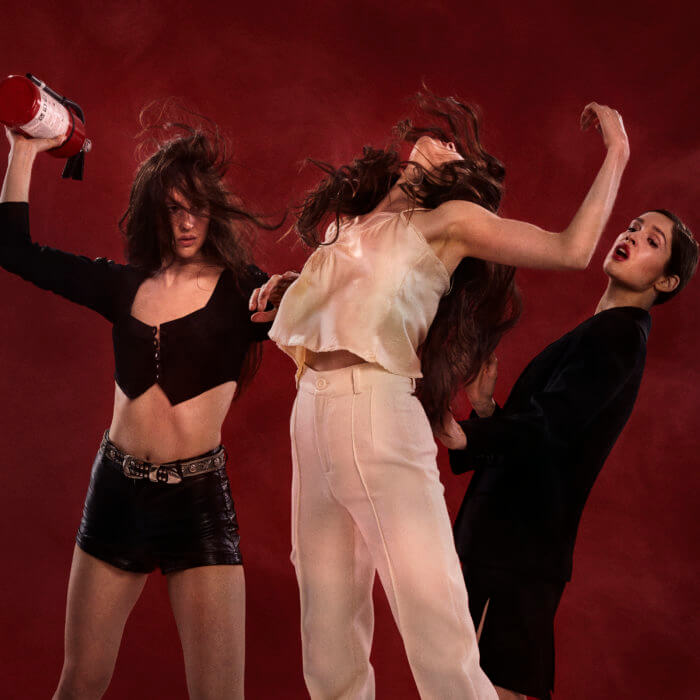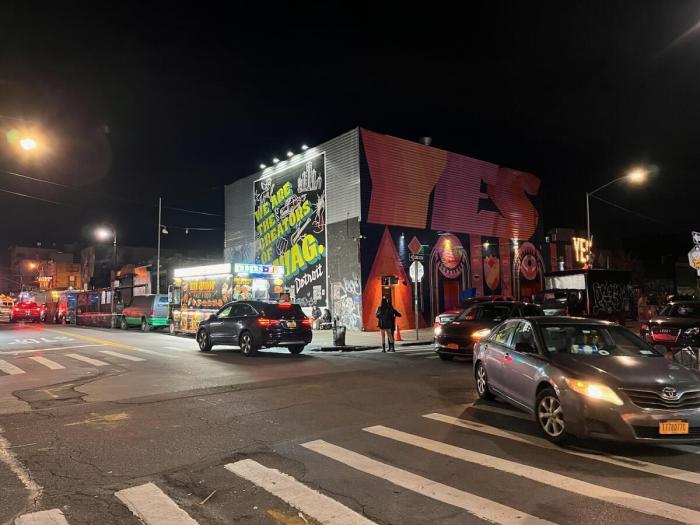Dance music lyrics are often merely functional placeholders, but Quebecois vocalist/ producer Marie Davidson’s past few albums have been built around her perspective as a hard-working but disenchanted artist. She has a unique approach, which she’s described as “spoken text” (as opposed to “spoken word”). She delivers her words in a flat tone as much as she sings, going back and forth between French and heavily accented English.
Her third and fourth solo albums, “Adieux au dancefloor” and “Working Class Woman,” reflected a growing cynicism with the culture she’s seen as she became increasingly popular touring EDM festivals. She declared that she played her last gig performing “live hardware club music” last September. When she released her trance-inspired single “Chasing the Light” last year, she made a similar statement about leaving dance music behind.
Davidson has formed a band, L’oeil Nu with Pierre Guerineau and Asaël R. Robitaille, whose debut album veers away from dance beat toward rock, pop, and even jazz influences.
Marie Davidson’s new band warmly, confidently embraces the 1980s
“Renegade Breakdown,” the title track of her new album with L’oeil Nu, shows Davidson at her most sarcastic. She sings “there are no money-makers on this record/ this time, I’m exploring the losers’ point of view… my life is anti-strategic, lying between comic and tragic.”
But from there, the album has a warmer sound. “Back to Rock” suggests an ‘80s hard rock power ballad, built around piano and both acoustic and electric guitar. “Just In My Head” luxuriates in warm vibraphone and strings. Although the background of L’Oeil Nu’s members is in electronic music, they worked with outside musicians to supply live instrumentation on this album. This is quite a contrast from the carefully recorded and mixed but harsh electronics of “Working Class Woman.”
The website Resident Advisor released a short documentary about Davidson earlier this year as part of its “Behind the Beats” series. Following her on tour, it reveals her isolation as a working musician. Although she makes a living traveling from one festival to the next, she’s not a DJ. Working with a set-up of synthesizers, sequencers, and drum machines that she lugs around Europe herself in a large crate, she says she sees herself as more akin to a rock band. (This live clip shows how she sets up the backing tracks of her songs, sings over them, and tweaks them live.)

But while she plays to large, enthusiastic crowds — she comments that she thought they were just there for the festival but then gets startled when they know the words to her songs — she tours alone, her insomnia aggravated by constant motion between time zones. It’s no wonder that her most popular song, “Work It,” takes rhetoric evoking self-care and Instagram hustle culture and makes it sound utterly joyless, more akin to putting in a shift at the factory. “Working Class Woman” also included the bluntly titled instrumental “Workaholic Paranoid Bitch.”
“Renegade Breakdown” looks back to the ‘80s in several ways. Davidson’s music has always been grounded both in techno and the minimal EBM sound of bands like D.A.F. This album introduces deliberately cheesy guitar and drum sounds out of that decade’s top. “Worst Comes to Worst” combines disco with heavy metal riffs. “My Love” and “Center of the World (Kotti Beats)” could get adult contemporary radio play; Davidson has cited Pat Metheny and Genesis as influences on the latter.
The title track of “Renegade Breakdown” marks the end of its cynicism, unlike previous Davidson albums. If it’s a manifesto, the rest of the album shows what she can do when she accepts that “there are no money-makers on this record.” She works with gentler textures rather than her usual harsh beats. The album presents her as a confident global traveler. “Center of the World (Kotti Blues)” describes life in the Berlin neighborhood of the title, singing to it as though it were her lover. Four of its songs have lyrics in French. Although Davidson is Canadian, not French, Francophone pop is a persistent influence on “Renegade Breakdown.” “Just In My Head,” her version of a jazz ballad, filters Chet Baker and Billie Holiday through Serge Gainsbourg.
Davidson started “Working Class Woman” with “Your Biggest Fan,” a dialogue with her most annoying and troubled fans. It’s her equivalent of Eminem’s “Stan.” That album was a commercial breakthrough for her, but the remix of “Work It” by Soulwax was far more popular than her original version. In fact, the remixes of “Workaholic Paranoid Bitch” by Nina Kraviz and “Day Dreaming” from Afrodeutsche are remarkably powerful. But the warmth of “Renegade Breakdown” is 180 degrees away from the jackhammer drum machine of “Workaholic Paranoid Bitch.” If the album looks backwards to the ‘80s, it also settles on an open emotional tone that feels like a breakthrough from the anxiety Davidson’s music has so often expressed.
MARIE DAVIDSON & L’OEIL NU | “Renegade Breakdown” | Ninja Tune





























